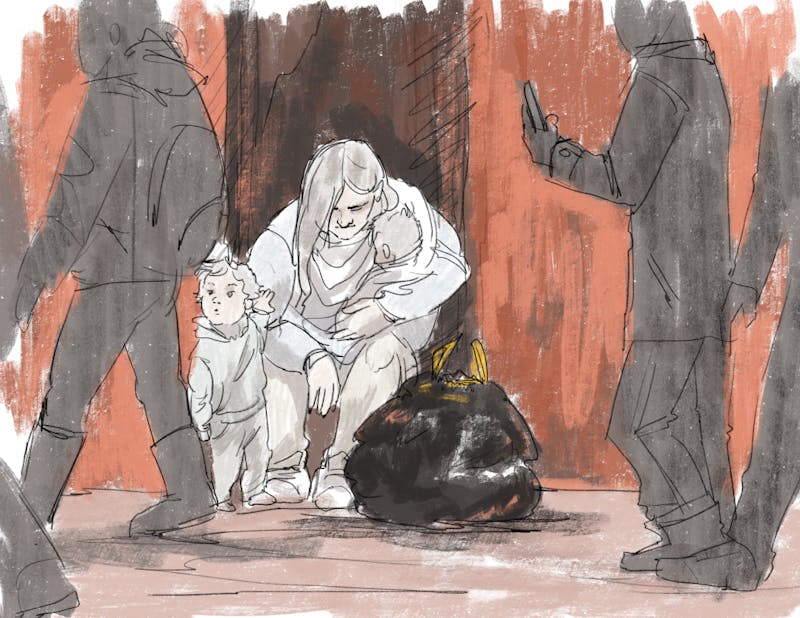
How high rent, low minimum wage and brutal winters impacts homeless and low-income women across the state
Image By: Max Homstad
How high rent, low minimum wage and brutal winters impacts homeless and low-income women across the state
Image By: Max HomstadAs the winter months continue to creep into Wisconsin, cold weather and dangerous storms relentlessly target those who are outdoors at the wrong time.
Homeless people in Wisconsin face many barriers, one of which is finding a safe and affordable place to stay during the bitter cold. Women and children can be particularly vulnerable to homelessness under these conditions.
The 2017 Annual Point in Time Count reported out of the 1,078 individuals in families who live in emergency shelters in Dane County, 602 are children.
“Speaking anecdotally, most of the households served in family shelter are female-headed households,” stated Continuum of Care Coordinator Torrie Kopp Mueller.
The Annual Homeless Assessment Report also recorded 462 single females who live in emergency shelters in Dane County alone.
The Elizabeth House in Dane County provides shelter and services to pregnant women who are struggling to find a place to stay, explained Julie Bennett, chief operating officer of the shelter.
“We can accommodate up to eight moms; seven of the rooms will accommodate a first-time mom, and one room can house a mom who has a toddler-age child, pregnant with a second child,” Bennett said.
She emphasized the importance of stability and routine the program seeks to provide in order to prepare their clients for their lives outside of the program.
“Stability in the housing area of her life allows her to build stability in other areas of her life,” Bennett said. “So the structure of the program, which includes things life curfews, chores, meal time expectations and routine for children … become part of her routine.”
Contrary to what many believe, most of the women in the Elizabeth House and across the state do not fit the common definition of homelessness, yet still struggle with finding a safe place to sleep.
Bennett explained the slight difference between being homeless and impoverished – although both can receive care at the shelter.
“Homelessness is if you are either sleeping outside or in shelter. Anything else is not homeless, if you are sleeping in a hotel you are not homeless, if you’re staying with a friend you are not homeless, if you’re trading your body for a place to sleep you’re not homeless. So it's a pretty tight definition,” Bennett said. “Most face a significant barrier to acquiring an apartment which is why they're sleeping couch to couch, because they can’t get their own.”
Many of these women discussed struggle with finding a place to sleep due to past issues such as debt or eviction, which is particularly dangerous for a pregnant woman.
The implications of the increasing cost of rent play a role in the limited options for women to find a safe place to stay.
Fair Market Rents set by HUD determined how much the average cost to rent a two-bedroom house has increased over the last few years.
In 2015, the rent in Milwaukee County was $896 per month, and today it is $918. In Dane County, a two-bedroom house averaged $928, which today has risen by over $150 since 2015.
“Imagine being a single mom, working a minimum wage job trying to afford that and meet all of the other needs of the family,” Mueller said.
Many want to call attention to the issue of low minimum wage in Wisconsin, which has stood at $7.25 since 2009, in order to help the homeless community find security.
Matthew Desmond, a Harvard professor and UW-Madison Ph.D graduate in sociology, wrote about this issue in an article for The New York Times.
“America prides itself on being the country of economic mobility, a place where your station in life is limited only by your ambition and grit. But changes in the labor market have shrunk the already slim odds of launching yourself from the mailroom to the boardroom,” he wrote.
Mueller brought attention to the struggle many homeless people face when trying to gain opportunities while also juggling the hardships of lacking a safe place to live.
“One cannot be expected to further their education, obtain better employment or invest in long-term savings while they are trying to figure out where they will sleep each night,” Mueller said. “We must have safe affordable housing available to everyone. Once people are housed and feeling safe and ready, then they can start to work on those other things.”
However, with Gov. Tony Evers’ plan to propose a bill in his upcoming budget to raise minimum wage to $15 via a slow-phase in period, women in poverty across the state may find relief.